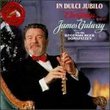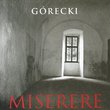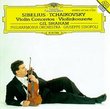| All Artists: Camille Saint-Saens, Christoph Eschenbach, Steven Isserlis, Joshua Bell, Pascal Devoyon, NRD-Sinfonieorchester Title: Camile Saint-Saëns: Cello Concerto No. 2; La Muse et le Počte; Romance Op. 76; Cello Sonata No. 2 Members Wishing: 0 Total Copies: 0 Label: RCA Release Date: 1/9/2001 Genre: Classical Styles: Chamber Music, Forms & Genres, Concertos, Instruments, Strings, Symphonies Number of Discs: 1 SwapaCD Credits: 1 UPC: 090266351824 |
Search - Camille Saint-Saens, Christoph Eschenbach, Steven Isserlis :: Camile Saint-Saëns: Cello Concerto No. 2; La Muse et le Počte; Romance Op. 76; Cello Sonata No. 2
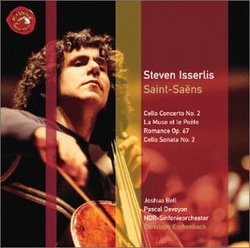 | Camille Saint-Saens, Christoph Eschenbach, Steven Isserlis Camile Saint-Saëns: Cello Concerto No. 2; La Muse et le Počte; Romance Op. 76; Cello Sonata No. 2 Genre: Classical
Steven Isserlis is a splendid cellist with a consummate technique and a focused, intense tone capable of infinite variety. He's an enterprising, imaginative musician with a penchant for centering programs on a single compo... more » |
Larger Image |
CD DetailsSynopsis
Amazon.com Steven Isserlis is a splendid cellist with a consummate technique and a focused, intense tone capable of infinite variety. He's an enterprising, imaginative musician with a penchant for centering programs on a single composer or national idiom. He has recorded French sonatas for Virgin Classics, and for RCA, the works of Mendelssohn, John Taverner, Haydn, and Czech and Russian composers. On his latest CD, Isserlis performs four relatively unfamiliar compositions of Saint-Saëns. Unfortunately, obscure works by a good composer are usually neglected for a reason. Indeed, the Second Concerto, Op. 119, and Second Sonata, Op. 123, presented here are inferior to their earlier counterparts in structural cohesion and melodic inspiration, though the Sonata contains an arresting, unusual Scherzo in the form of variations and a devout, dramatic slow movement. There are also two shorter pieces: Romance Op. 67, an appealingly melodious, slow, dreamy, subdued piece, and "La Muse et le Poète," Op. 132, for solo violin and cello with orchestra. An extended tone-poem, almost impressionist in its colorful orchestration, "La Muse" is mostly a rhapsodic dialogue between the two soloists, who unite only in a few climactic moments. Both parts are extremely difficult and continually ascend into the highest register. Isserlis has chosen his partners wisely. Joshua Bell's brilliant virtuosity and radiant, soaring tone give the music a rapturous, ecstatic expressiveness. In the Sonata, pianist Pascal Devoyon, a specialist in French music who also partners with Isserlis on the French recording, is a marvelous collaborator. Isserlis plays with a combination of austere nobility and romantic ardor that bring out the music's strengths and conceal its weaknesses. --Edith Eisler Similarly Requested CDs
|
CD ReviewsA Great Recording of Little Know Saint Saens D. A Wend | Buffalo Grove, IL USA | 01/30/2001 (5 out of 5 stars) "The works on this disc are not heard very often but is music that is certainly worthy of frequent hearing. This recording of the Second Cello Concerto follows upon an earlier recording of Saint Saens First with the same forces. The second concerto is more lyrical and less dramatic than the first and is cast in two movements. La Muse ET la poete is an interesting work with a dialogue between a violin (played by Joshua Bell) and a cello with orchestra. The romance is an interesting work with cello and horn as solo instruments. Perhaps the most dramatic work is the Cello Sonata, a brilliant work that is quite a showpiece for the cello. Steven Isserlis is wonderful in this recording and Christoph Eschenbach and the North German Radio Symphony ably support him. If you enjoy the music of Saint Saens it is worth exploring these lesser know works." THE REAL SAINT-SAENS (an underrated composer) Raymond Vacchino | Toronto, ON. Canada | 02/23/2008 (5 out of 5 stars) "As discussed in an interview with Steven Isserlis and Jeremy Nicholas on an underrated composer, we find that Saint-Saens was indeed a brilliant composer, conductor, pianist, play write, poet and lecturer. He gave his concert debut at the age of ten and when asked to give an encore Saint-Saens announced to the audience that he could play all of the Beethoven sonatas by memory and would be pleased to perform any one of their choosing! His compositional output was not prolific considering the long life he had, unlike Schubert. Perhaps it was due to the fact that Saint-Saens was an "experimenter." He also had no "real" style that could be pinpointed as a result, yet his compositions for the cello were extremely difficult and purely lyrical. He was a brilliant pianist, performing his "Marche Militaire Francaise" composed in 1904 in concert in his eighties with a virtuosic technique, crystalline fast notes and admirable accuracy. In his orchestration of a cello suite for cello and piano, done at the end of his career, Op.16, he added an extra Tarantella movement showing off the silly side of his character. At his eighty-third birthday party many people attended to just make this misunderstood, great human being feel ignored and slighted. Artur Rubenstein met Saint-Saens, and described him as fat man that looked like a french bank official, nervous speech with a large hooked nose and spoke with a lisp. Very much like Beethoven and Brahms, people either liked them or hated them. Yet underneath both men was a compassionate, loving individual. Saint-Saens loved Faure, and would do anything he could for him. In return Faure treated him like a son. Saint-Saens had a tragic life and a marriage that fell apart after his two very young son's died only six weeks apart. His uncontrolled grief was to cause him to blame the deaths on his wife causing her to leave Saint-Saens. Strangely enough, his grief was to show up in a Requiem Mass composed just eight days before the death of his first child. The Cello Sonata No.2, is lesser known and difficult to grasp at first, unlike the first sonata, yet when finally inside the work it conveys its deeply felt pure lyricism, passion, intense depth of mood and seamless phrases, very much like the magnificent "Berceuse" in B flat, composed for violin and piano. (Look for performance by Pascal Devoyon and Philippe Graffin). This is a work that should be a staple of every cellist's repertoire. The second Cello Concerto is a masterpiece and the performance given by Steven Isserlis and Christoph Eschenbach with the NDR Sinfonieorchester is stellar. The slow movement is conveyed like a gem to behold. It is deeply felt, monstrously difficult, purely lyrical and looks like a piano part. It offers a perfect balance of melodic lines that are lovingly cherished. The other striking aspect about this performance is the expansive range of colour, not only from the soloists but also from the Orchestra who play their hearts out. "La Muse et le Poete" Op.132, adds a poetic dialogue to the cello played on the violin by the cherished and impressive Joshua Bell. Adding Eschenbach and the NDR Orchestra to the performance conveys the full vitality, inflections, the more agitated passages within the piece, and makes their finale a culmination of unanimity in their shared passages. "Romance" Op.67, is a piece to be relished with passages that convey musical interplay between the cello and horn section. Its themes are beautifully resourceful and harmonically adventurous, which show an awareness of the musical establishment of the period. As one would expect, the overall performances are all superior due to the exceptional calibre of the artists. The comprehensive approach and musical "purity" reveal a solidly established personality allied to good taste, forthright, powerful and formidable virtuosity. Author: Raymond Vacchino M.Mus. Classical Music Critic" Little known and interesting J. Bevan | Mansfield, TX USA | 05/09/2007 (5 out of 5 stars) "I've kicked around classical music for almost 50 years. I did not know these pieces. For me they are new and interesting. The performances are first rate and the recording up to the best modern standards.
Alas, the pieces do not have the intrinsic magnetism of the 1st Cello Concerto. But if you're into something unusual or trying to complete a Saint-Saens collection, you probably won't do better for these little-known and lesser recorded gems of the French master." |

 Track Listings (8) - Disc #1
Track Listings (8) - Disc #1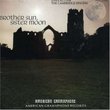
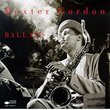

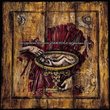


![Across The Universe [Deluxe Edition]](https://nationalbookswap.com/cd//m/51/1251/1241251.jpg)
